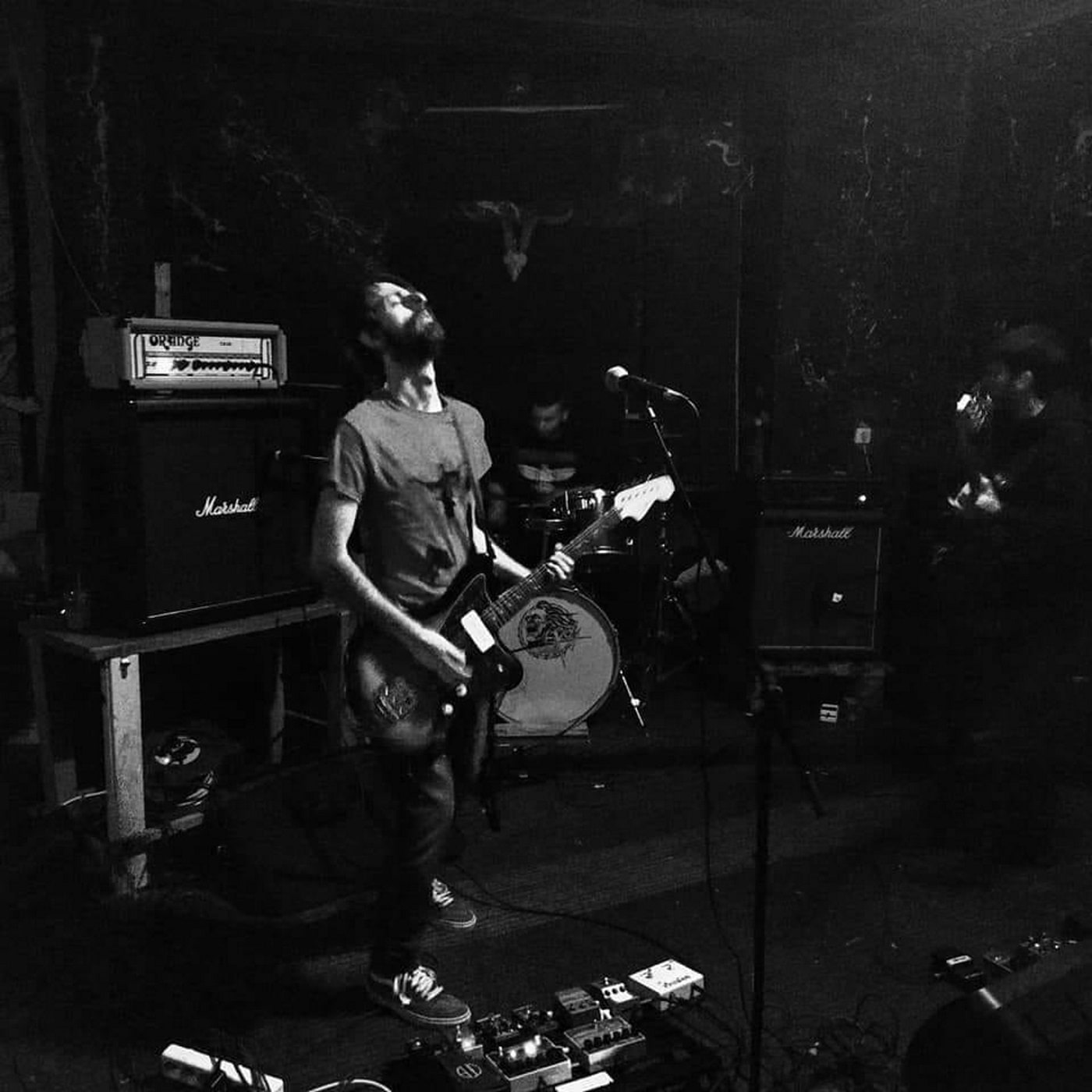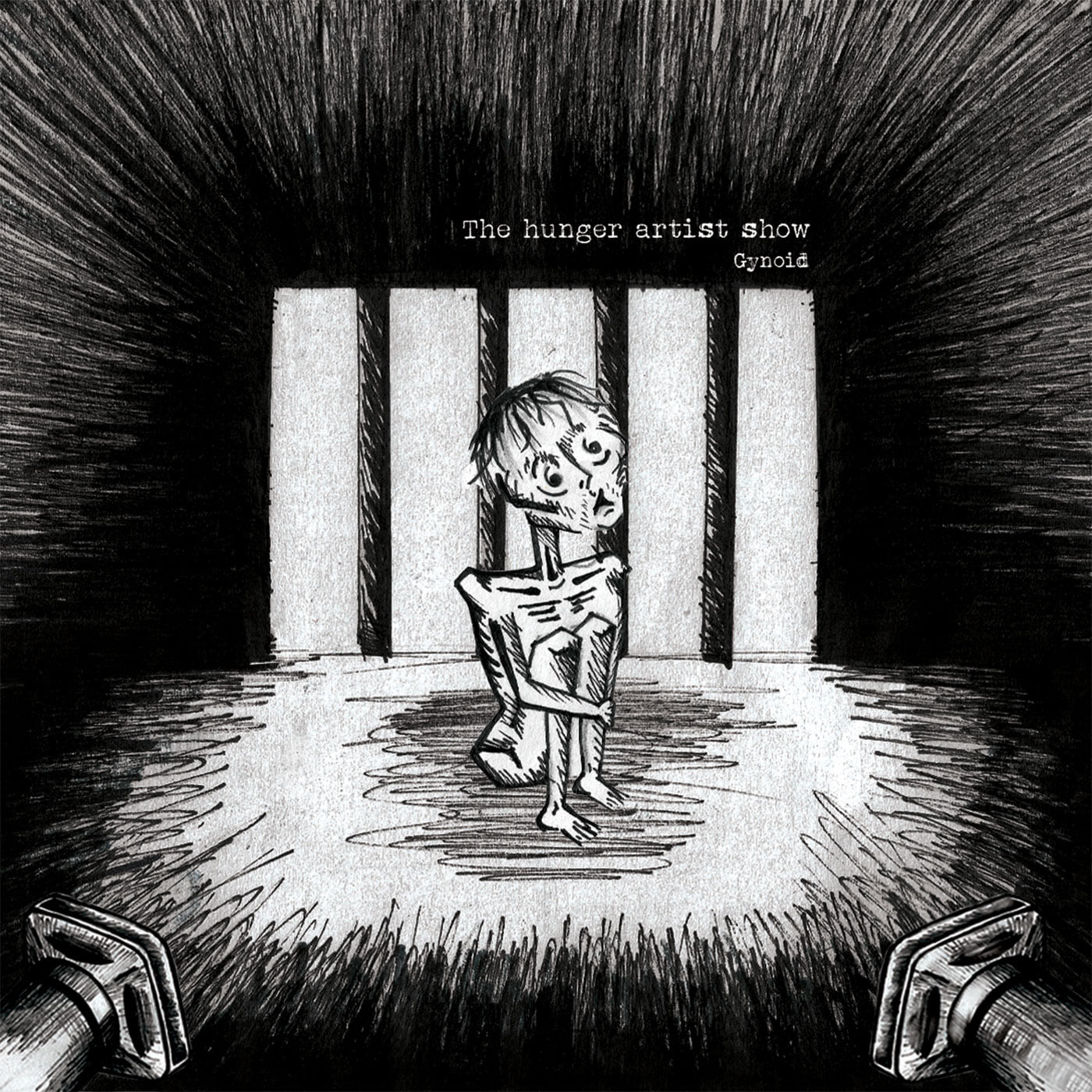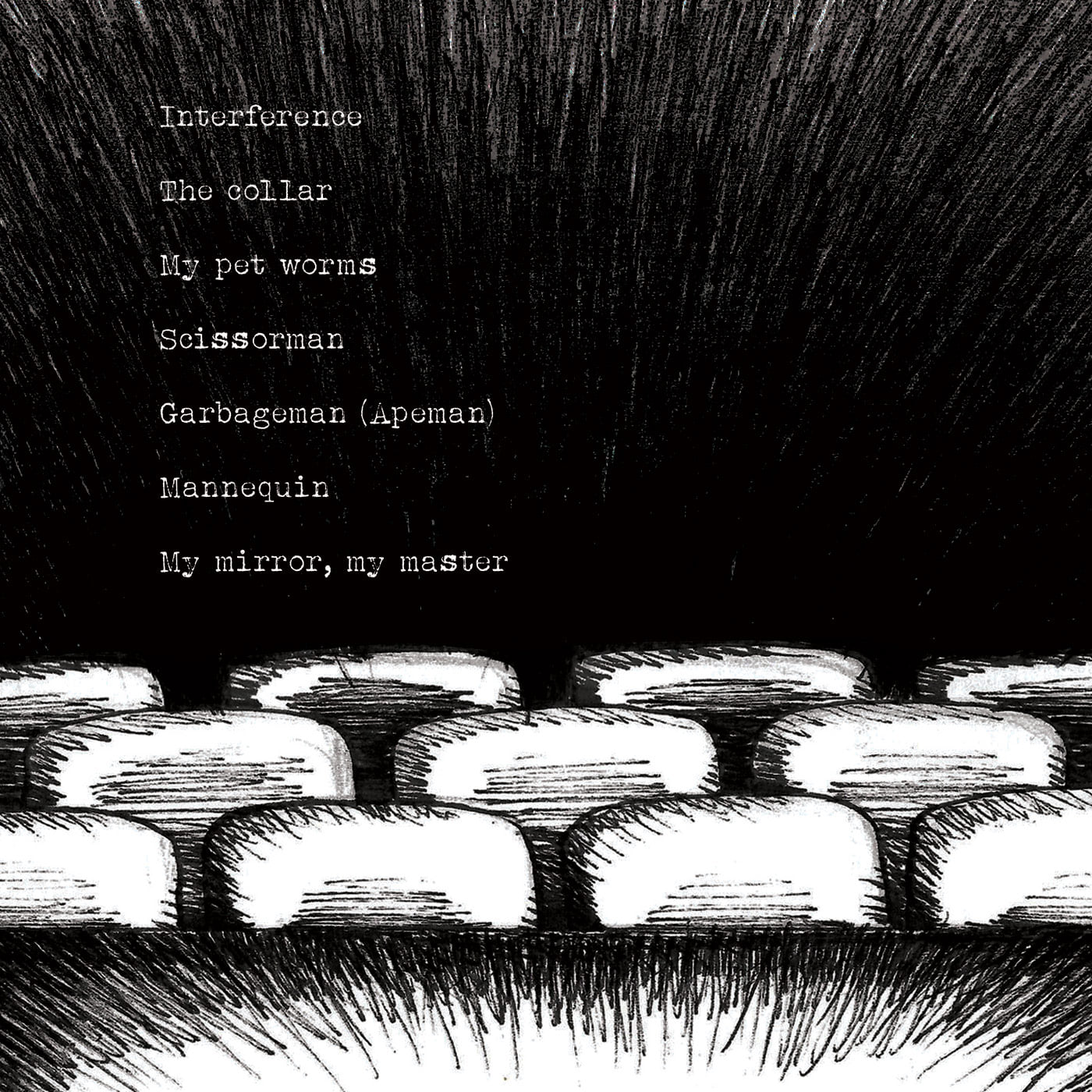GYNOID is a 3 piece noise rock band from Thessaloniki, Greece, comprised of Spyros Tsalouchidis (guitar/vocals), Panagiotis Dedis (bass guitar), and Nikos Dimitriou (drums). The band name was chosen as a comment on traditional gender roles in society. Gynoid’s music is inspired by multiple different styles of music in the punk and metal worlds, particularly noise rock, post hardcore, sludge metal, and post punk. The band is releasing their quality debut album, “The Hunger Artist Show”, next month, and today we’re giving you a proper teaser with their full track by track rundown and special list of noteworthy bands from the Greek Underground!
The band started out in April 2016 by Spyros and Panagiotis, playing covers of their favorite bands and dipping their toes into writing original material. After multiple lineup changes, the band found its permanent lineup with the addition of Nikos behind the kit.
Musically, GYNOID blends elements of these different styles in an attempt to seamlessly create music that sounds urgent, and original. Some of their influences include: Shellac, Melvins, Sonic Youth, Eyehategod, Nirvana, The Birthday Party, System of a Down as well as some more mode rn bands like Daughters, IDLES, Metz, and Whores.
Since 2018 they have performed in multiple DIY spaces and squats in Greece, playing alongside Chronoboros, Mavro Gala, Living Under Drones, Plebah, and other bands of the Greek underground. Their live sho w is characterized by loud volume, high intensity and overall weirdness.
“The Hunger Artist Show” was recorded amidst the global COVID 19 pandemic in May and June of 2020, at Shellac Recording studios, in Thessaloniki. The title of the record is in reference to the Franz Kafka short story “A Hunger Artist”. This album, inspired by multiple facets of Greek society, the media, and mental illness, aims to portray the dehumanization and general ugliness of hu man beings and the power structures that surround them. It tackles that ugliness head on, by presenting it with noisy, angular instrumentals and disturbing lyrics. On March 7 2021, they released their first promo track from the album, The Collar The album will be released physically on CD, and on cassette tape, on Kontingent Records.
𝑇ℎ𝑒 𝐻𝑢𝑛𝑔𝑒𝑟 𝐴𝑟𝑡𝑖𝑠𝑡 𝑆ℎ𝑜𝑤 𝑤𝑎𝑠 𝑐𝑜𝑛𝑐𝑒𝑖𝑣𝑒𝑑 𝑖𝑛 𝑎𝑛 𝑒𝑓𝑓𝑜𝑟𝑡 𝑡𝑜 𝑝𝑜𝑟𝑡𝑟𝑎𝑦 𝑎𝑛𝑑 𝑐𝑜𝑚𝑚𝑒𝑛𝑡 𝑜𝑛 𝑐𝑒𝑟𝑡𝑎𝑖𝑛 𝑎𝑠𝑝𝑒𝑐𝑡𝑠 𝑜𝑓 𝑠𝑜𝑐𝑖𝑒𝑡𝑦 𝑡ℎ𝑎𝑡 𝑤𝑒 𝑣𝑒ℎ𝑒𝑚𝑒𝑛𝑡𝑙𝑦 𝑑𝑒𝑠𝑝𝑖𝑠𝑒, 𝑠𝑢𝑐ℎ 𝑎𝑠 𝑣𝑎𝑝𝑖𝑑 𝑠𝑒𝑛𝑠𝑎𝑡𝑖𝑜𝑛𝑎𝑙𝑖𝑠𝑡 𝑚𝑒𝑑𝑖𝑎, 𝑚𝑖𝑠𝑜𝑔𝑦𝑛𝑦, 𝑟𝑎𝑐𝑖𝑠𝑚, 𝑎𝑛𝑑 𝑓𝑒𝑎𝑟 𝑡𝑜𝑤𝑎𝑟𝑑𝑠 𝑡ℎ𝑒 𝑚𝑒𝑛𝑡𝑎𝑙𝑙𝑦 𝑖𝑙𝑙.
Explain the band: “The title was chosen as a reference to Franz Kafka’s short story “A Hunger Artist”, a work that inspired much of the record, and similarly has themes of marginalization and dehumanization of its protagonist by society and power structures within it.”
“The songs on the album were written between the years 2015-2018, but we feel that the themes are unfortunately becoming more and more relevant in our, as well as everyone’s lives. During the COVID-19 pandemic, life in our country has become increasingly oppressive, with the government, media, and police being catalysts for that oppression. Constant news cycles full of government corruption, police brutality, economic austerity, as well as ever changing rules and regulations have made our current reality more Kafkaesque than we could have imagined when writing these songs.”
Interference/The Collar
Interference serves as the introduction to the album, and to the following track, The Collar. There’s multiple tracks of guitar noises, as well as a sample from the “Max Headroom Incident”, a clip from an infamous TV piracy incident that took place in Chicago in 1987. In the clip, a man wearing a Max Headroom mask (Max Headroom was a character from a popular TV series at the time), is jokingly rambling about nothing in particular, with his voice distorted, and later gets his ass spanked with a fly swatter by a lady in a maid outfit, while he screams/laughs incoherently. The clip is simultaneously hilarious and disturbing, which we felt perfectly fit the tone and audio aesthetic we were going for in the following song, The Collar.
The Collar was written during the summer of 2016, and it is about the perceived dual nature of television to dull the mind with cheap entertainment, and simultaneously provide a vicarious involvement in human suffering. Much of the song was inspired by the story of Aylan Kurdi, a 3 year old Syrian boy who drowned in the Mediterranean Sea as his family were seeking refuge in Europe. The story made headlines in every major media outlet in Greece at the time, in a very hypocritical way, coming from the same media outlets that referred to refugees as “illegal immigrants” and used the refugee crisis to breed fear and hate against the refugees. That hypocrisy was what fueled us to write this bitter, sarcastic song. It’s also my personal favorite song we’ve written.
My Pet Worms
This was the first song written for Gynoid, before the band even existed, in late 2015. At the time I was inspired a lot by the transgressive lyrics of The Dead Kennedys, and wanted to emulate that style. I didn’t put very much thought into the lyrics originally, but later came to realize they could be viewed as being pro-animal rights, which I feel is a very valid interpretation. The whole song was written in one afternoon, which I think is crazy, considering how much we all like it.
Scissorman
Scissorman, musically speaking, was our effort to rip off Shellac’s sound. The entire song is built on one syncopated riff, and the musicality comes from the dynamics and building tension. The lyrics are describing the thoughts of a schizophrenic person having a mental health crisis, in first person. There’s a strong implication that this person has been abused due to their illness, which causes them to have thoughts of being persecuted, and needing to run away from their environment. The song was written in 2016, and since then I’ve grown a little uneasy with the portrayal of the main character, as I have become more informed about mental illness. However, the main themes of escaping abuse, and finding the help one needs, are ones that we stand by.

Garbageman (Apeman)
Garbageman was written in early 2018, shortly after Nikos joined the band. The main riff is something I came up with while studying Duane Denison’s guitar playing in Tomahawk, and we ended up building the song around that. It is also one of the most fun songs to play live for me, because the vocal performance is very theatrical and over the top. The lyrics were inspired by the films “Taxi Driver”, and “Amerika Square”, and are sung through the perspective of a racist vigilante, akin to Travis Bickle, who murders immigrants. The song explores how people rationalize their racism, even in a scenario as extreme as this, and how society at large ignores racism when it is convenient. We think this theme is very relevant in our country, as well as many others, with the rise of far right movements all over the world, throughout the past decade.
Mannequin
Mannequin is the song where our hardcore and sludge metal influences come through the most, and it’s usually the song we end our shows with. It uses the tried and true method of writing a quiet verse, and a loud chorus, to get the heavy parts to sound heavier. The lyrics were inspired by the ancient Greek myth of Pygmalion, a sculptor who fell in love with a statue he had carved. Pygmalion made offerings to the altar of Aphrodite, the goddess of love, and wished for her to turn his statue into a real woman, which she did. This is a story that always seemed misogynistic to me, so it’s framed as such in the lyrics. The song’s POV, the sculptor, is constantly unhappy with the statue he’s building, and always seeks to “improve” it so it suits him, the same way an abuser seeks to “correct” the behavior of their victim, through force and psychological manipulation.
My Mirror, My Master
This is also one of the first songs we wrote as a band, although it has been iterated upon multiple times since it was first written. The lyrics were written as a poem back when I was in high school, and they talk about body image through a character suffering from anorexia nervosa. Sonic Youth’s “Tunic (A Song for Karen)” was a major inspiration when I was writing the lyrics. Musically the song is built on two dissonant chords, that loop over and over, but with increasing intensity and dynamics throughout the narrative of the song, as the disease consumes the song’s protagonist. It’s similar in some ways to post-rock, kind of how a Slint song would be written. My Mirror is definitely one of the more challenging songs to perform, both instrumentally and vocally, because of its dynamic range, and theatrical vocals, but it’s always interesting to see how people respond to it in a live setting.
13 bands from the Greek Underground, by GYNOID!
• PLIVII
• Mammock
• Thymics
• Plebah
• Zebu
• Calf
• Monofo
• Krause
Alternatively, listen through a special playlist on YouTube HERE.












